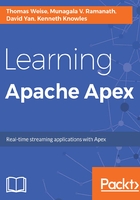
Preface
With business demand for faster insights derived from a growing number of information sources, the stream data processing technology is gaining popularity. Open-source-based products have become the prevailing implementation choice, and there has been a shift from the early MapReduce-based batch processing paradigm to newer, more expressive frameworks designed to process data as streams with minimal latency, high reliability, and accuracy guarantees.
Apache Apex is a large-scale stream-first big data processing framework that can be used to build low-latency, high-throughput complex analytics pipelines that execute on clusters. Apex was developed in 2012, and is continuously improving, and today it is being used in production by a number of companies for real time and batch processing at scale.
The big data landscape has a wide array of technology components and choices, and it remains a challenge for end users to piece everything together to be successful with their big data projects and realize value from their technology investments.
This book will focus on how to apply Apex to big data processing use cases. It is written by experts in the area, including key contributors of Apache Apex who built the platform and have extensive experience working with users in the field that use Apex in their enterprise solutions. This book is an instructional and example-driven guide on how to build Apex applications for developers and hands-on enterprise architects. It will help identify use cases, the building blocks needed to put together solutions, and the process of implementing, testing and tuning applications for production. Fully functional example projects are provided to cover key aspects of data processing pipelines such as connectors for sources and sinks and common transformations. These projects can also be used as starting points for custom development.
To connect with the Apache Apex project, please visit the website (http://apex.apache.org/), subscribe to the mailing lists mentioned there, or follow @ApacheApex on Twitter (https://twitter.com/apacheapex) or on SlideShare (http://www.slideshare.net/ApacheApex/presentations).